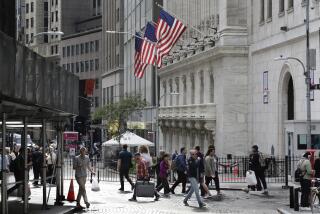IMPACT OF THE GULF WAR : Rumors Rev Up the Pace for Oil Traders
- Share via
NEW YORK — It’s 11:03 a.m. Friday. Yet another rumor sweeps the floor of the New York Mercantile Exchange: Iraqi President Saddam Hussein has been shot.
The rumor is swiftly relayed by phone to Merrill Lynch’s giant energy-futures trading room in the 24th-floor trading room in the World Financial Center here. Instantly, adrenaline begins to flow.
Trading has never been a career for the laid back. These days, amid vicious price swings and sharply stepped-up volume, Merrill’s 18 oil traders--like their colleagues around the world--are frantically working overtime dissecting and analyzing every report and rumor from the Persian Gulf as they try to divine the direction of petroleum prices.
The story about Hussein is of obvious potential importance: The Iraqi leader’s death could mean an end to the fighting, a lifting of the threat to Mideast oil facilities--and sharply lower oil prices.
“Is there a source?” barks Larry Lawrence into one of the two phones cradled against his ears. Moments later, the 31-year-old trader announces to his colleagues: “No source. It’s just a floor rumor.”
Within minutes, a fresh and possibly related story starts making the rounds: Hussein’s family has fled Iraq for Mauritania. This time, the story carries the imprimatur of the British Broadcasting Corp.--and this time, the market reacts.
By 11:35 a.m., West Texas intermediate crude has fallen $1 a barrel to $20.80. Although the story also proves false and prices bounce back up, the selling pressure resumes on a report that Iraq’s foreign minister has called on the United States to resume negotiations. Oil closes Friday at $19.25 a barrel, down $2.19 for the day.
So it goes on the volatile world oil market. Up on a Cable News Network report of a possible second missile attack on Israel. Down on U.S. Army Gen. H. Norman Schwarzkopf’s assertion that allied air forces have had great success in locating and destroying Iraq’s Scud missile launchers.
Six months ago, a price move of $2.19 a barrel in a single day would have been big news. These days, it seems like small change, especially compared to the record $10.56 plunge on Thursday.
Still, the gyrating prices have kept oil traders busy.
“I’ve been up the last three days at 3 in the morning and on the phone until 8 at night,” says broker Richard A. Redoglia, 33, a Pasadena native.
Otherwise, he says, he might miss out on the action in London, where trading begins at 4:30 a.m. Eastern time.
Signs of the Persian Gulf crisis abound throughout the trading room, and not only on the five video screens each trader scrutinizes constantly for the latest news and price data.
TV sets are tuned to CNN. A picture of Saudi Arabia’s King Fahd is taped to the time stamp on which Lawrence records his trades. A rubber chicken named Saddam hangs from a makeshift noose.
Traders blow off steam by swapping jokes. “Baghdad just released its housing statistics,” goes the latest. “They were flat.”
Merrill’s trading room is what’s known in the business as a commercial institutional office.
“We deal with the major players--the big refiners, producers and users who use futures to insulate themselves and their businesses against price swings,” says Robert J. Ascher, Merrill’s resident manager of futures sales. “This is not for the doctor or dentist trying to speculate on the direction of oil prices.”
Although trading here can get hectic, things are positively serene compared to what goes on at the New York Mercantile Exchange--also known as the Merc--where the shoving and shouting have become stock footage for television news. (Brokers in Merrill’s trading room often bring buyer and seller together by relaying orders to Merrill representatives on the Merc’s floor.)
The work is tough and pressure-filled, but it can be financially rewarding. An established trader can earn $100,000 to $500,000 or more a year. “But 90% of the people who get into the business don’t last,” says Ascher.
“It’s a personality thing,” he adds. “Someone might be great with numbers but not be good with customers. Or he might hate having two phones in his ears. I know I sure wouldn’t want to stand in a pit all day and scream my lungs out.”
MIDEAST UPDATE With mines sighted floating in the Persian Gulf and Iraq’s strategy unclear, the cost of war risk insurance policies for ships and their cargoes continued to rise Friday. Premiums of up to 5% of a ship’s value were being quoted by Lloyd’s of London underwriters.
A nationwide telephone survey of 135 households Wednesday by a Chicago market research firm found that 75% of those responding were less willing to travel by air as a result of the outbreak of war.
The airlines relaxed their normally ironclad fare restrictions to permit international ticket holders to make changes without penalty. Conditions vary by airline. United Airlines and Northwest Airlines also relaxed the rules for domestic travel.
Fearing that U.S. airlines may become terrorist targets, some business travelers were choosing to charter private jets--despite the cost, often more than double the fare on a commercial airliner.
The gulf war has sparked a sudden increase in orders for a bomb-detection machine that can sniff out minute traces of explosives in seconds.
U.S. bankers have built up their cash positions substantially in recent weeks, in part to ensure that borrowers would have access to credit during the war.
Gold Prices Dollars per troy ounce, New York Commodity Exchange Jan. 18: $374.20
More to Read
Inside the business of entertainment
The Wide Shot brings you news, analysis and insights on everything from streaming wars to production — and what it all means for the future.
You may occasionally receive promotional content from the Los Angeles Times.










